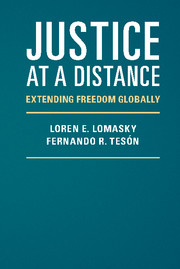Crossref Citations
This Book has been
cited by the following publications. This list is generated based on data provided by Crossref.
Tesón, Fernando R.
2011.
HUMANITARIAN INTERVENTION: LOOSE ENDS.
Journal of Military Ethics,
Vol. 10,
Issue. 3,
p.
192.
Tesón, Fernando R.
2017.
Reexamining Customary International Law.
p.
86.
Boettke, Peter J.
2017.
Economic Policy of a Free Society.
SSRN Electronic Journal ,
KOCAOĞLU, Mehmet
2018.
SİYASET FELSEFESİNDE İNSANİ MÜDAHALE PROBLEMİ.
Bolu Abant İzzet Baysal Üniversitesi Sosyal Bilimler Enstitüsü Dergisi,
Vol. 18,
Issue. 4,
p.
213.
Novak, Mikayla
2018.
Inequality.
p.
217.
Boettke, Peter J.
2018.
F. A. Hayek.
p.
197.
Boettke, Peter
2019.
Economic policy of a free society.
The Review of Austrian Economics,
Vol. 32,
Issue. 2,
p.
107.
Kuo, Yuchun
2019.
Liberal Democracy, Illiberal Immigrants, and Equality.
Global Policy,
Vol. 10,
Issue. 1,
p.
130.
Arcos, Federico
2019.
Challenging the Borders of Justice in the Age of Migrations.
Vol. 18,
Issue. ,
p.
37.
Arcos Ramírez, Federico
2020.
¿Primero los nuestros? Apertura controlada de fronteras y cosmopolitismo moderado.
Bajo Palabra,
p.
73.
Ridley, Dennis
and
de Silva, Aryanne
2020.
Game Theoretic Choices Between Corrupt Dictatorship Exit Emoluments and Nation-Building CDR Benefits: Is There a Nash Equilibrium?.
The American Economist,
Vol. 65,
Issue. 1,
p.
51.
Cohen, Andrew Jason
2021.
What liberals should tolerate internationally.
Critical Review of International Social and Political Philosophy,
Vol. 24,
Issue. 1,
p.
64.
Freiman, Christopher
and
Hidalgo, Javier
2022.
Only libertarianism can provide a robust justification for open borders.
Politics, Philosophy & Economics,
Vol. 21,
Issue. 3,
p.
269.
Forster, Elisabeth
and
Taylor, Isaac
2022.
Asking the fox to guard the chicken coop: In defense of minimalism in the ethics of war and peace.
Journal of International Political Theory,
Vol. 18,
Issue. 1,
p.
91.
Lamour, Christian
2023.
The truth of two cities: Trieste, Rijeka and the interplay between nationalism and cosmopolitanism in cross-border regional Europe.
Identities,
p.
1.
Cheang, Bryan
and
Palmer, Tom G.
2023.
Institutions and Economic Development.
p.
183.
Sønderholm, Jørn
2023.
Why privilege the Europeans? A discussion of FIFA’s rules for international transfers for under-18 players.
Journal of the Philosophy of Sport,
Vol. 50,
Issue. 2,
p.
190.
Sønderholm, Jørn
2023.
Why the FIFA Men's World Cup in Qatar Should not be Boycotted by Rich Countries from the Global North.
Public Affairs Quarterly,
Vol. 37,
Issue. 1,
p.
20.





